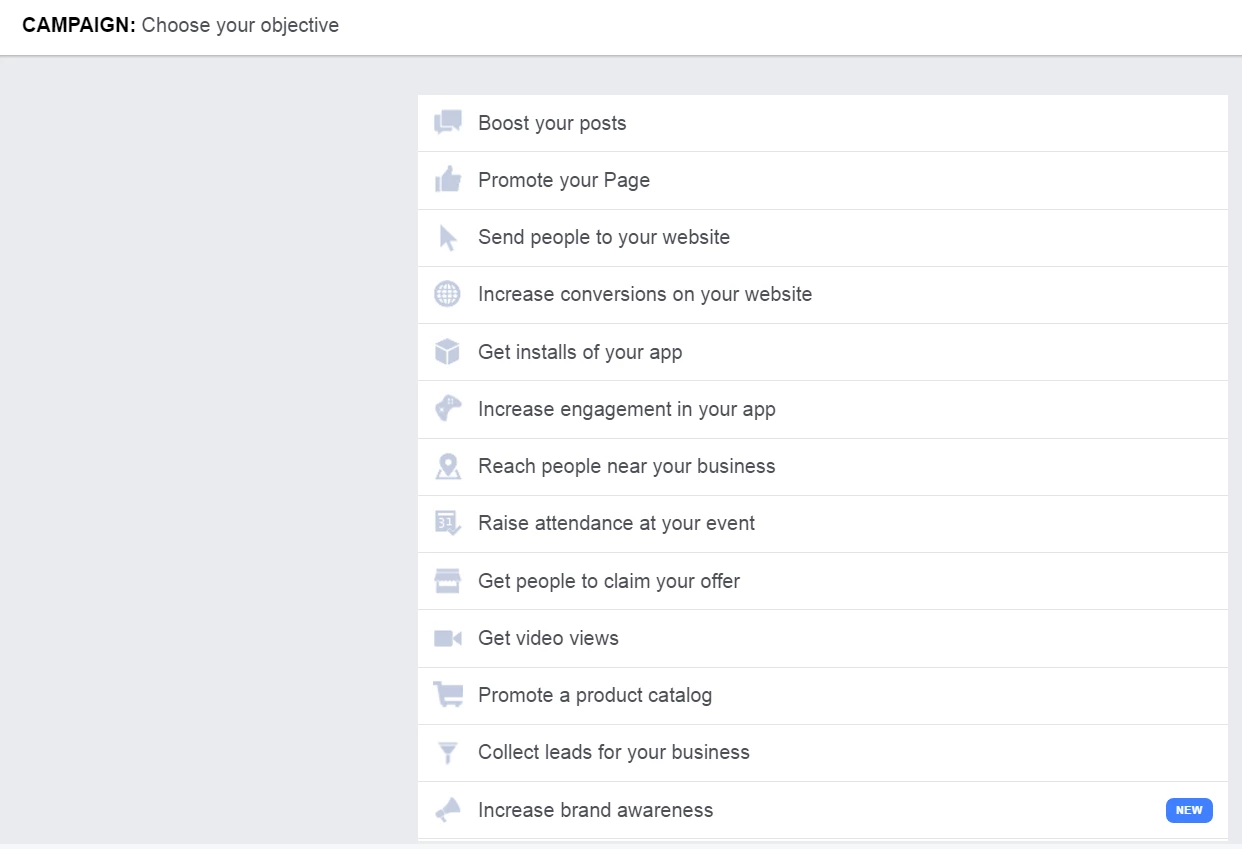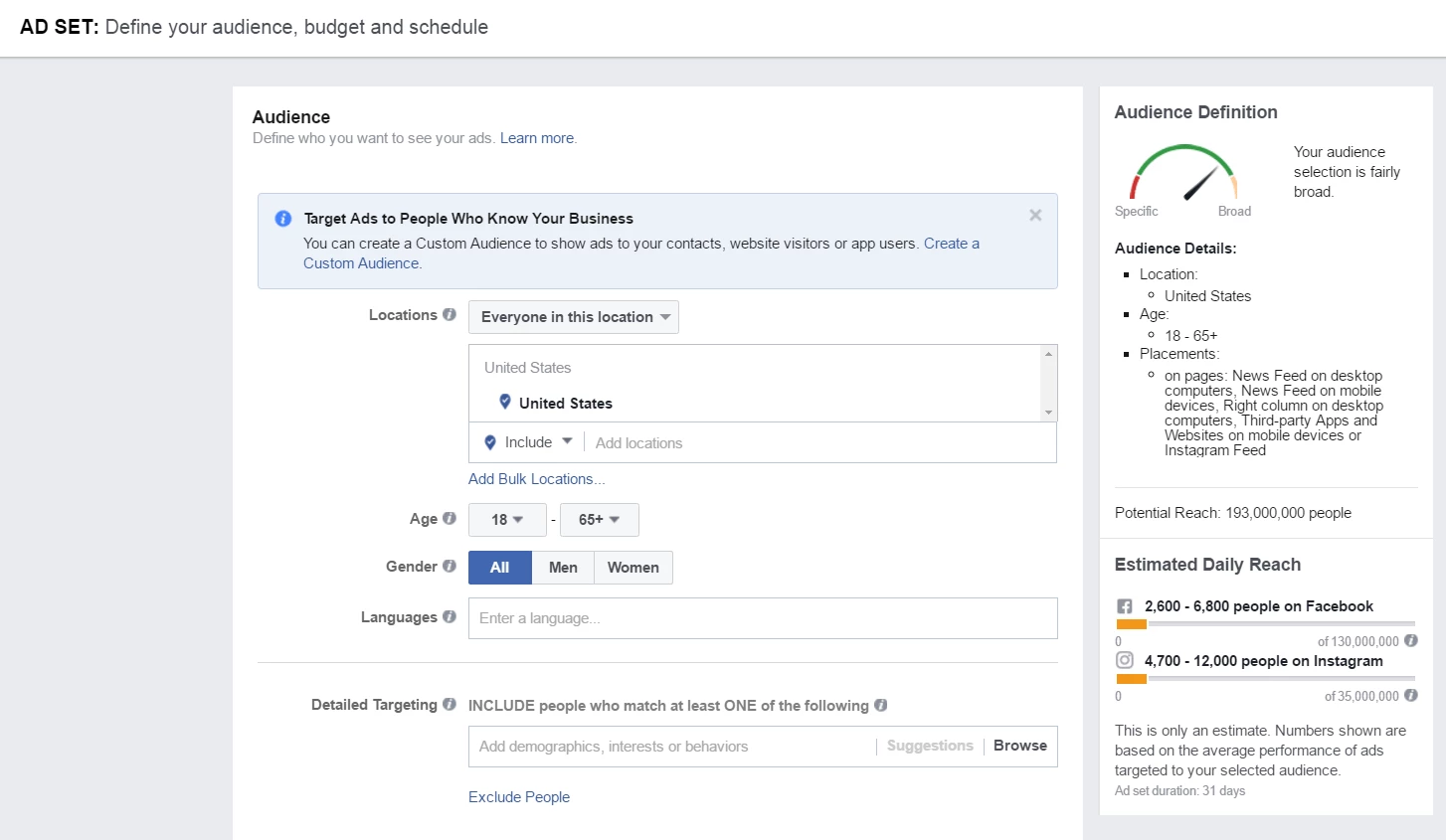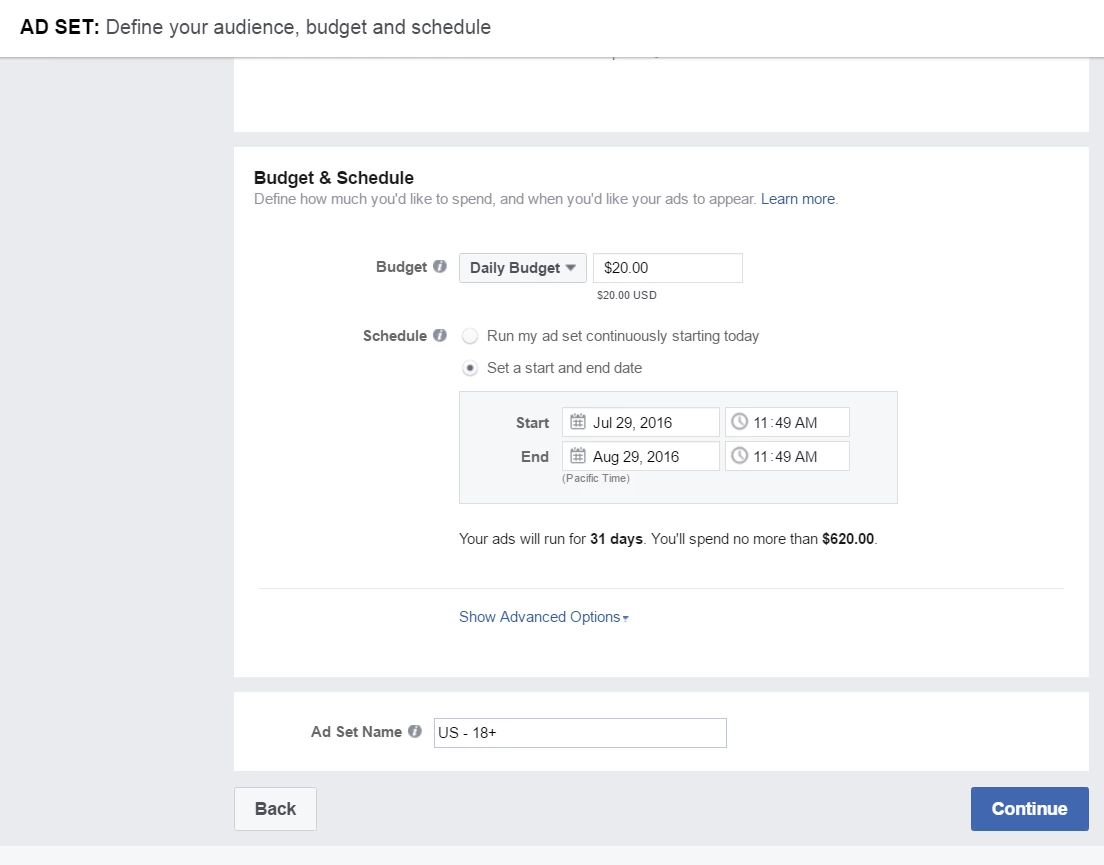Legal Marketing Tip: Google Ads vs. FB Ads
As the battle between Google and Facebook rages on, businesses everywhere—law firms included—are trying to determine where to focus their marketing efforts—in terms of both time and money. Advertising on both Google and Facebook is highly-effective for client generation and client retention, but there are noticeable differences between the two.
Ideally, you should be using both Google and Facebook to market your law firm, but if you want to focus on just one network, here is a breakdown of key similarities and differences that you should know about.
Google vs. Facebook Advertising: Similarities
Both Google and Facebook are incredibly effective for brand development and online exposure—they lead the pack among all online marketing networks, social media or otherwise (although Twitter’s getting close).
Both Google and Facebook are PPC advertising portals, but they offer free marketing tools in addition to paid campaigns: Google offers Google+ Business Pages, and Facebook offers Fan Pages.
Google vs. Facebook Advertising: Differences
Google excels in display advertising, where Facebook is better at building brand awareness. Google also has better CPC performance, and a variety of ad formats that Facebook doesn’t.
Facebook’s sessions tend to last longer than a Google session, however, and Facebook allows businesses to target certain groups with specific messages. For instance, a San Diego personal injury attorney could send a FB message to the San Diego chapter of MADD, with contact links, etc.
Other key differences between Google and Facebook include:
Keyword Targeting
- Google: Keyword specification is required
- Facebook: Targeting with keywords is optional
Geographic Targeting
- Google: Can target by location and keywords
- Facebook: Can target by location, keywords, interest, workplace, and age
Competition Ratio
- Google: Although crowded, Google is still a top-producing advertising network
- Facebook: Facebook is a newer platform, so there are fewer advertisers (law firms) to compete with
Legal Marketing Tip: Why Attorneys Need To Use Facebook Ads
As an attorney actively marketing your law firm, you’ve probably heard about the latest marketing trend: social advertising. With the continued rise of social media, social advertising; e.g. paid ads on Facebook, is the next generation of online marketing for businesses—including law firms.
Law firms can benefit from the power of Facebook ads, if they’re launched and maintained correctly. If you’re considering using Facebook ads, but aren’t quite sure what this entails, here are some tips to guide you.
First, What is a Facebook Ad?
Essentially, Facebook has three sales channels for ads: Direct, Inside, and Online.
Direct sales deals with the largest global brands; think Apple and Nike. Direct sales ads have assigned account teams that promote and manage a company’s account, for which this company pays Facebook hundreds of thousands of dollars a year to do so.
Inside sales handles the next level of company clients. These companies are assigned a sales rep to manage their Facebook advertising, but don’t have the same support as direct sales accounts.
Online sales are the most common, and are for those who advertise on Facebook via the online, or self-serve, channel. You can create an ad right from the admin panel of your profile page, or you can use the ad create tool.
Facebook ads include marketplace ads, page post ads, and sponsored stories. To find out the most effective ads for your legal marketing goals, check out Facebook For Business.
Why Your Law Firm Should Invest in Facebook Ads
For starters, most online advertising reaches only 27% of its intended audience. Facebook’s average is 91%.
And, as opposed to other forms of online marketing; e.g. Google Adwords, you don’t need to think about what keywords your target audience is looking for on Facebook—you just need to know who your target audience is.
For example, if most of your clients come from your zip code, you can narrow your focus so that your Facebook ads are only displayed to people who live in that zip code, or the closest surrounding zip codes. Plus, with Facebook Mobile, clients on-the-go who see your ad can contact your firm instantly.
Facebook Ads Generate Buzz
Facebook ads give you the ability to have your ads seen not only by your direct followers, but also by the people those followers are connected to. And when your Facebook ads start generating likes and comments—and good ones do—your visibility will increase tremendously.
Easy Tracking Results
Like all advertising, some strategies work better than others. Facebook offers a tracking interface that tracks your KPI’s (key performance indicators), and lets you see results information so that you can tweak your ad strategies, if need be.
How To Boost Your Site Traffic with Facebook Ads
If you have never used Facebook Ads Manager before, the numerous options can seem like one giant headache. However, once you understand how to navigate the system, Ads Manager transforms into a strong legal marketing device with the potential to put your advertisements in front of the right audience and ultimately, push traffic to your law firm’s website.
This step-by-step guide outlines exactly how to create a social media advertisement on Facebook Ads Manager so that your law firm can experience greater online marketing ROI.
Step 1: Log into your Facebook account.
Access your Facebook Business account through Business Manager by visiting business.facebook.com. There, you should have access to your law firm page and advertising accounts. If you don’t already have a Business Manager account, visit the aforementioned URL and set up a profile. The system will walk you through the process of building an account, creating an associated ad account, linking your business page(s), and assigning permissions to team members.
Is your firm still using a business page that is linked to a partner’s personal Facebook page rather than a Business account? You can still use Facebook Ad Manager following these basic guidelines, but you may want to switch to a Business Manager account for greater security and better account management. Business Manager enables the account admin to give certain permissions to team members, which streamlines collaboration while ensuring that the account remains under the purview of a trusted law firm partner or marketing manager.
Once you have an ad account in place and connected to your chosen payment method, you are ready to move on to the next step.
Step 2: Create a campaign and set an objective

Facebook Ads Manager provides a slew of objectives to choose from. If you are new to advertising on Facebook, it is best to try something simple like “Send people to your website.” This objective can direct hundreds of new and repeat visitors to your law firm’s website, which is an excellent way to get more eyes on your homepage, A/B split test landing pages, and gather blog readers.
One last thing—after setting an objective, be sure to name your campaign.
Download our free guide and learn about the importance of key performance indicators (KPIs)
Step 3: Define your audience

Focusing on the people within your Ideal Client Profile is the key to pushing the right kind of visitors to your law firm’s website. Define your audience using these parameters:
- Location: you can focus on people who live within your city or zip code
- Age
- Gender
- Languages Spoken: a great opportunity to promote your firm’s multilingual services
- Demographics, Interests, or Behaviors: for instance, a divorce and family law firm could focus on parents with early school age children
- Connection Type: this option provides the ability to hone in on friends of the people who Like your law firm’s Facebook page, for example
Step 4: Decide where to place your ad
Ads Manager provides two options: automatically display your advertisement in areas recommended by Facebook or choose your placements manually. Should you choose your placements, you can decide whether you would like your ad on:
- Audience members’ Facebook News Feeds (mobile and/or desktop)
- The right column area of desktop displays
- Facebook’s Audience Network that includes partner mobile apps and mobile websites
Step 5: Assign a budget

With Ads Manager, your firm has control over how much to spend on each advertisement. In the basic options section, you can choose a daily budget or a lifetime budget, and decide between running the ad continuously or within a certain time period. These controls enable you to limit spending and more easily determine the ROI of each ad set or campaign.
This is particularly important for small law firms with limited marketing budgets, and larger practices that want to avoid running multiple advertising campaigns at one time.
Step 6: Select the type of ad

Would you prefer one image or video or multiple images? For example, you could feature a testimonial video featuring a client who received Social Security disability benefits by working with your law firm, or headshot photos of each of your friendly attorneys.
Step 7: Add text and connect your firm’s Facebook page
Use this section to connect your law firm’s Facebook and Instagram accounts, and enter the text for your advertisement. Keep in mind that too much text can severely limit your ad’s reach. Facebook recommends minimal text, citing that “Facebook ads that contain images with little to no text tend to cost less and have better delivery than ads with image text.”
Step 8: Run the ad and assess effectiveness
Once you’re finished tweaking your advertisement and reviewing your chosen options, click “Place Order” to run the ad.
Afterward, don’t just consider the campaign out of sight and out of mind. Regularly check in to assess the effectiveness of your ad by viewing ad spend, the amount of traffic heading to your law firm’s website, and the number of visitors that convert into clients. If the ROI is less than ideal, go back through the steps above to experiment with slightly different ad elements and observe which changes result in greater audience engagement.
More than 1/3 of lawyers have obtained clients from social networking. Contact us today for help with your social media marketing!
Facebook Graph Search: A Powerful New Tool for Lawyers
Facebook has 1.1 billion active monthly users and roughly 665 million daily active users. Think about that for just a moment. A good portion of the entire human race interacts with Facebook on a daily basis, and even more of them stop by at least once per month.
If you’re an attorney, how can you possibly ignore numbers like these? Setting your firm up on social media sites should be a top priority if you want to succeed in the future.
Something New: Social Search
One interesting feature of Facebook that most attorneys aren’t aware of is Graph Search, which is Facebook’s first foray into becoming a serious search engine that may someday rival Google in power and ease of use. Considering all of the personal data that Facebook has access to—potentially including your location, workplace, education history, preferences for music and food, friends and family members, and even brands you like—it is likely that Graph Search will eventually deliver more personal, accurate results than Google could ever hope to.
Right now, Graph Search is in an extended beta phase, meaning you can sign up to gain access, but it is not available to all members quite yet. However, any law firms ignoring this forthcoming—and potentially revolutionary tool—would be tempting fate, since anyone from the most rural Social Security disability claimant to the sophisticated, cosmopolitan injury claimant may be using Facebook at any given time.
How Does Graph Search Work?
Upon gaining access to Graph Search, your Facebook toolbar will be altered significantly. A more prominent search box will prompt you to “Search for people, places and things.” Clicking this box opens a new world of possibilities, and at the moment it looks like this:
Very quickly, you get the idea that Facebook is attempting to provide search results based upon what your connections have already liked, places they have visited, and more. Want to know what movies your friends think are great? Click and find out. Interested in trying a new, local restaurant, or even one in a city you’ve never been to? Easily done via Graph Search. Why bother going to Yelp (or even Google) when Facebook leverages your social connections’ reviews and interests for you? You probably trust your friends’ recommendations over those of a total stranger.
How Is This Applicable to Attorneys?
At the moment, the basic options for Graph Search are limited to what you see in the screen shot above. However, the system is actually more powerful than it first appears. Start typing “law firms” and Facebook suggests “Law Practices In [City Near You]” (according to either your hometown or your current place of residence). This means that people can actually search for an attorney using Facebook, and then immediately see which firms their friends and family members have “liked” or visited (via a check-in).
That type of immediate endorsement serves as a referral, and one you had to do almost nothing to gain. If Injured Irene needs help with her auto accident, is she more likely to trust the results on Google, which have no personal connection to her, or the results on Facebook, which showed her a law firm that her friend has liked? The answer is fairly obvious. The personal connections Facebook has at its disposal are the powerhouse behind Graph Search. Google cannot compete with this type of social web, at least for the moment.
Seeing Is Believing
You may be thinking to yourself, “All of this is too complicated. My average client isn’t going to know how to do this.” You would be absolutely incorrect in that assumption. Think of how prevalent smart phones are. We have tiny computers in our pockets that can access the entirety of human information in seconds, and it’s a good bet that every one of your clients can work a smart phone pretty well. Facebook’s Graph Search is a breeze by comparison.
Let’s take a quick look at what Graph Search can do in seconds. Hypothetically, let’s assume I am looking for an attorney in San Antonio. All I need to do is type “Law Practices in San Antonio” into Graph Search, and Facebook presents me with the information below.

Keep in mind that I don’t have any connections in the San Antonio area. If I did, however, and any of my connections had interacted with these firms on Facebook, I would immediately know. Not only can I see where these firms are geographically, but I can check out photos, contact information, and more right away.
Additionally, Facebook gives me the option to refine my search on the right side of the page. You can actually narrow a search by who has liked or visited a firm, as well as the geographic area. Looking for an instant source of referrals? Interact with your clients on Facebook and look no further.
Attorneys: Start Using Social Media Today
If you only take one thing away from this post, it should be that the power of social media is immense, and it is only going to grow month by month, year by year. Graph Search is less than six months old; imagine what it will be able to by 2014. Get started on your social media campaign now if you haven’t already, and don’t get left behind.
4 Killer Alternatives to Banner Ads
Banner ads have seen better days. Thanks to ad fatigue and the proliferation of adblocking software, most banner advertisements are lucky to experience 1% clickthrough rates… and roughly half of those clicks can be chalked up to wayward mouse movements. It’s time for your law firm to retire banner ads and pursue these effective attorney internet marketing alternatives instead.
- Sponsored or promoted social media posts
Pretty much every major social media platform has its own version of paid posts.
- Twitter offers Promoted Tweets
- Pinterest users can purchase Promoted Pins
- LinkedIn offers brands the opportunity to buy sponsored ads
- Facebook enables Promoted Posts and ads
These paid social media posts typically look similar or identical to regular posts except for small notations saying “Sponsored” or “Promoted,” and they appear in users’ feeds just like posts from their friends and family members. Because they blend in so well, they tend to attract audiences far more effectively than banner ads. The key to paid social media marketing is to target the right market when setting up your promoted or sponsored post, and make the content appeal to that specific market.
For example, Tom is an attorney specializing in DUI defense who wants to appeal to people living in the Pittsburgh, Pennsylvania area. He would like to use a Facebook advertisement to push traffic to the firm’s website in order to gain more clients that fit his ideal profile. Tom could take these steps:
- Go into Facebook Ads Manager
- Identify the objective for the campaign
- Set the audience parameters—21- to 40-year-old males living in the Pittsburgh area who own a vehicle
- Create an image-heavy advertisement that highlights his firm’s experience with fighting DUI charges
- Feature his website’s URL in the advertisement so viewers can easily route to the homepage
- Wait for his advertisement to appear in front of audience members who fit his specified demographic
Note: Just because sponsored/promoted posts can be so useful doesn’t mean that you should give up on regular, unsponsored posts. They’re free for your law firm and can push quite a bit of traffic to your website if you post regularly, feature engaging content, and interact with followers. The best attorney internet marketing strategies use a combination of paid and free posts. For instance, your firm can pay to promote a post that performed really well among your audience in order to get it in front of more eyes.
- Podcasts
Podcasts aren’t just the latest marketing trend; they are a powerful tool that has been gaining traction for brands across the globe. According to Edison Research, an estimated 57 million people in America listen to podcasts. Apple reports that podcast subscriptions via iTunes have exceeded 1 billion.
Consider partnering up with another attorney in your niche and hosting a weekly 30-minute podcast addressing common legal questions, issues, and current events in your space. Advertise it on your website and social media to garner listeners, and ask for questions and episode ideas from your audience in order to make the show engaging.
If you just can’t spare the resources to host a podcast, try sponsoring a relevant podcast in exchange for a handful of brief advertisements about your firm. You will still receive some attorney internet marketing benefits with less effort.
Download our free guide and learn about the importance of key performance indicators (KPIs)
- Content marketing, including guest blogging
Content marketing hasn’t lost its vigor. Blog articles, white papers, e-books, newsletters and infographics can consistently engage your viewers on a deeper level than banner advertisements.
Maintaining your legal blog and sharing articles to social media should be a priority in your attorney internet marketing plan. If you already have that at the top of your list, take it up a notch and start developing guest blogging relationships. Don’t personally know anyone to guest blog for? Take a few minutes to brainstorm and research blogs popular in your local area or within your client demographic, keeping in mind that the blogs don’t need to be law related.
An estate planning and trust lawyer could contribute to a successful real estate blog in order to connect with potential home buyers or current homeowners. If the attorney knew of a popular blog but didn’t personally know the owner or main contributor, then she could send an introductory email offering to spearhead a new legal feature on the blog.
- Email marketing
According to Campaign Monitor, email marketing generates nearly $40 in ROI for every $1 spent. That’s a lot better than most banner ads! To make your law firm’s email marketing as compelling as possible, tailor email campaigns to each recipient’s demographic or behavior. Everyone who downloads a free PDF containing tips to assess and pay down credit card debt, for instance, should automatically start receiving a related 6-week email campaign that highlights your bankruptcy law services.
It may seem like a lot of work to develop an entire email campaign when compared to creating a small banner advertisement, but you will undoubtedly see greater rewards for your efforts.
Social media can improve your website’s search engine ranking. Call today to ask about our social media marketing services that are designed to help busy attorneys! For more information on Google Ads vs. Facebook Ads, and what’s best for your law firm marketing, get a hold of us. We’ll help you sort out all the details.
We assist with advertising on Facebook, and other social media marketing tactics, contact one of our legal marketing specialists today.
![]() Learn how our social media marketing services can boost leads to your legal practice.
Learn how our social media marketing services can boost leads to your legal practice.







 Our passion is helping law firms reach their goals. We are a results-driven agency and believe your success is our success. We provide law firm marketing to lawyers across the country, helping them reach their business goals. We provide a custom approach to make the most of our clients’ resources. Contact us today to find out how we can increase your leads, hires, and revenue.
Our passion is helping law firms reach their goals. We are a results-driven agency and believe your success is our success. We provide law firm marketing to lawyers across the country, helping them reach their business goals. We provide a custom approach to make the most of our clients’ resources. Contact us today to find out how we can increase your leads, hires, and revenue.